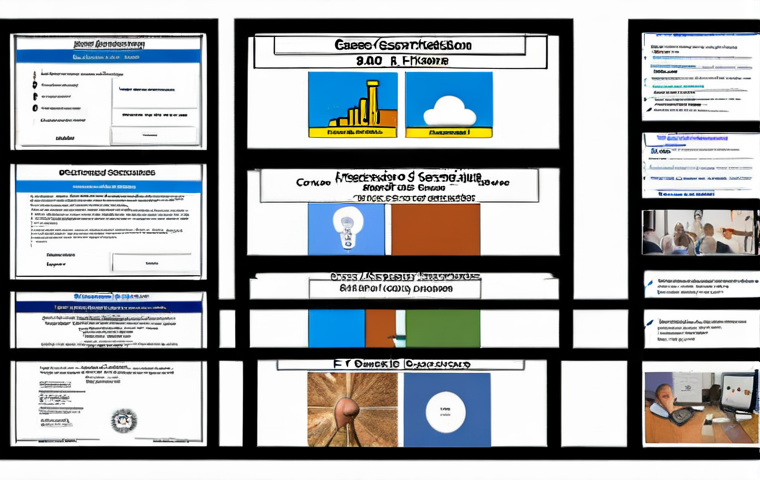So, you’re thinking about getting your gas certification? That’s awesome! It’s a solid career path with good prospects, especially with the growing focus on energy efficiency and safety.
Choosing the right study materials can seriously boost your chances of acing the exam. From my experience, having a mix of textbooks and practice exams is key to feeling confident on test day.
Let’s dive into the best resources to get you prepped and ready! Let’s find out more details in the article below.
Okay, here is the blog post content:
Cracking the Books: Essential Study Guides for Your Gas Certification

So, you’re diving into gas certification? Smart move! But let’s be real, those exams can be a beast. I remember when I was prepping, feeling totally lost in a sea of regulations and technical jargon. That’s where having the right study guide comes in clutch. It’s not just about memorizing facts; it’s about understanding the practical applications. Think of it as your roadmap to navigating the maze of pipes, pressures, and safety protocols. Trust me; a good study guide is your best friend during those late-night study sessions.
Why Invest in a Solid Study Guide?
Honestly, it’s the difference between feeling like you’re taking a shot in the dark and walking into that exam room with confidence. A quality study guide breaks down complex topics into manageable chunks. When I was studying, I was struggling with understanding gas pressures and how they interact with different systems. The right guide made it all click, like finally finding the missing piece of a puzzle. Plus, they often include practice questions that mimic the actual exam format, which is gold when it comes to time management and getting used to the question styles.
Key Features to Look For
Not all study guides are created equal, that’s for sure. You want to look for a guide that covers all the essential topics outlined in the certification exam syllabus. Make sure it includes clear explanations, diagrams, and real-world examples. When I was choosing my guide, I made sure it had plenty of visual aids. Trying to understand technical drawings just from text was a headache. Also, check for updated information – gas regulations change, and you don’t want to be studying outdated material. Look for a guide that has been recently updated to reflect current industry standards and codes.
Practice Makes Perfect: The Power of Mock Exams
Okay, let’s talk practice exams. They are not just helpful; they are non-negotiable. Think of them as dress rehearsals for the real show. I learned this the hard way when I took my first practice exam. I thought I knew the material inside and out, but under the pressure of the clock, I froze. That’s when I realized I needed to simulate the exam conditions as closely as possible. Practice exams help you identify your weak areas, get comfortable with the format, and build your confidence. Trust me; the more you practice, the less likely you are to panic on exam day.
Benefits of Regular Practice Exams
The benefits are huge, I’m telling you. First off, they help you pinpoint your knowledge gaps. After each practice exam, take the time to analyze your mistakes. Did you consistently struggle with a particular topic? Focus your study efforts there. Secondly, they improve your time management skills. Gas certification exams are often timed, and you need to learn how to pace yourself. Practice exams allow you to experiment with different strategies and find what works best for you. Finally, they reduce exam anxiety. The more familiar you are with the format and types of questions, the more relaxed you’ll feel on the actual day.
Tips for Effective Practice Exam Use
Don’t just blindly take practice exams. Be strategic. Set aside a dedicated time and place where you won’t be interrupted. Simulate the actual exam conditions as closely as possible – no distractions, no cheating! After each exam, thoroughly review your answers, even the ones you got right. Understand why the correct answer is correct and why the incorrect answers are wrong. Focus on learning from your mistakes rather than just memorizing the answers. And remember, consistency is key. Regular practice exams will significantly boost your chances of success.
Navigating the Codes: Mastering Gas Regulations
Let’s face it: gas regulations can seem like a foreign language. But they are the backbone of your certification. I remember struggling to decipher the codes and standards. It felt like trying to navigate a maze blindfolded. The key is to break them down into manageable sections and understand the reasoning behind each regulation. It’s not just about memorizing numbers and letters; it’s about understanding the principles of safety and compliance.
Understanding Key Codes and Standards
You need to familiarize yourself with the relevant codes and standards for your specific certification. These may include the National Fuel Gas Code (NFGC), the International Fuel Gas Code (IFGC), and any local or state regulations. Each code covers different aspects of gas installation, operation, and maintenance. I found it helpful to create a cheat sheet with the most important codes and their corresponding regulations. Carry it with you, study it whenever you have a free moment.
Resources for Staying Up-to-Date
Gas regulations are constantly evolving, so you need to stay current. Subscribe to industry newsletters, attend workshops and seminars, and join professional organizations. The National Fire Protection Association (NFPA) and the American Gas Association (AGA) are excellent resources for staying informed about the latest changes. Also, check your local and state regulatory websites for updates and announcements. Remember, ignorance is not an excuse when it comes to safety and compliance.
Real-World Scenarios: Applying Knowledge to Practical Situations
Okay, so you’ve memorized the codes and regulations, aced the practice exams, but can you apply that knowledge in real-world situations? That’s what separates the book smarts from the street smarts. I remember when I encountered a complex gas leak situation on a job site. All the theory I had learned went out the window. I needed to think on my feet, assess the situation, and apply the correct procedures. That’s where real-world scenarios come into play. They help you bridge the gap between theory and practice.
Case Studies and Examples
Look for study materials that include case studies and examples of real-world gas-related incidents. These scenarios will challenge you to think critically and apply your knowledge to solve problems. For instance, a case study might describe a gas explosion caused by improper installation. By analyzing the scenario, you can learn about the common mistakes that lead to such incidents and how to prevent them. I found it helpful to discuss these scenarios with colleagues and mentors. Their insights and experiences can provide valuable perspectives.
Hands-On Training Opportunities
Supplement your study materials with hands-on training opportunities. Look for workshops, seminars, and apprenticeships that allow you to work with real gas equipment and systems. Hands-on experience will solidify your understanding of the concepts and build your confidence. When I had the opportunity to work alongside experienced technicians, I learned so much more than I could have from textbooks. It’s one thing to read about how a gas valve works; it’s another thing to take it apart, inspect it, and put it back together.
Online Resources: Websites, Forums, and Communities
In today’s digital age, there’s a wealth of online resources available to gas certification candidates. Websites, forums, and online communities can provide valuable information, support, and networking opportunities. I remember feeling isolated when I was studying for my certification. That’s when I discovered online forums and communities. Connecting with other candidates and experienced professionals was a game-changer. I was able to ask questions, share resources, and get encouragement.
Recommended Websites and Forums
Several websites and forums cater to gas professionals and certification candidates. The AGA website offers a wealth of information about gas safety, technology, and regulations. Online forums such as the HVAC-Talk and the Engineering Forums provide a platform for discussions, Q&A sessions, and knowledge sharing. Be sure to participate actively in these communities, ask questions, and share your experiences. You never know who you might connect with or what valuable insights you might gain.
Utilizing Online Communities for Support
Online communities can provide invaluable support during your certification journey. They can offer motivation, encouragement, and a sense of camaraderie. When you’re feeling overwhelmed or discouraged, turn to these communities for support. Share your struggles, ask for advice, and celebrate your successes. Remember, you’re not alone in this journey. There are many others who have been where you are and are willing to help you succeed. Engaging with online communities can make a significant difference in your overall experience.
Creating a Study Schedule: Time Management and Organization
Okay, let’s face it: studying for gas certification can be time-consuming and demanding. That’s where time management and organization come into play. I remember feeling overwhelmed by the sheer amount of material I needed to cover. That’s when I realized I needed a structured study schedule. A well-planned schedule will help you stay on track, prioritize your tasks, and avoid burnout. Trust me; a little planning goes a long way.
Breaking Down the Syllabus into Manageable Tasks
Start by breaking down the certification syllabus into smaller, manageable tasks. Identify the key topics and subtopics you need to cover. Allocate a specific amount of time for each topic, based on its complexity and importance. I found it helpful to create a daily or weekly study plan, outlining the specific tasks I needed to complete each day. Be realistic about your time commitments and don’t try to cram too much into one day. It’s better to study consistently for shorter periods than to try to cram for hours on end.
Setting Realistic Goals and Deadlines
Set realistic goals and deadlines for your study schedule. Don’t try to cover everything in one week. Instead, set achievable goals for each day or week. For instance, you might aim to review one chapter of your study guide each day or complete one practice exam each week. Be flexible and adjust your schedule as needed. Life happens, and you might need to adjust your plans to accommodate unexpected events. The key is to stay committed to your goals and not get discouraged by setbacks.
| Resource Type | Examples | Benefits |
|---|---|---|
| Study Guides | NFGC Handbook, IFGC Study Guide | Comprehensive coverage, structured learning |
| Practice Exams | Online practice tests, mock exams from training centers | Familiarization with exam format, time management |
| Codes and Standards | NFGC, IFGC, local regulations | Understanding legal requirements, safety standards |
| Online Forums | HVAC-Talk, Engineering Forums | Community support, Q&A, shared resources |
| Training Courses | Hands-on workshops, certification prep courses | Practical experience, expert guidance |
Wrapping It Up
So, there you have it! Getting your gas certification is no walk in the park, but with the right study guides, practice, and resources, you’ll be well on your way to success. Remember to stay focused, stay persistent, and don’t be afraid to ask for help when you need it. You’ve got this!
Good to Know
1. Check out local community colleges for discounted prep courses; they often offer flexible schedules.
2. Join online forums specific to your state or region for localized code updates.
3. Consider investing in a digital multimeter to get hands-on experience measuring electrical components.
4. Download free practice exam apps on your phone for studying on the go.
5. Network with certified professionals at industry events; their insights can be invaluable.
Key Takeaways
Solid study guides simplify complex gas regulations.
Regular practice exams are crucial for mastering the exam format and time management.
Staying up-to-date with the latest codes and standards is essential for safety and compliance.
Real-world scenarios bridge the gap between theory and practical applications.
Online resources and communities provide valuable support and networking opportunities.
A well-structured study schedule will help you stay on track and avoid burnout.
Frequently Asked Questions (FAQ) 📖
Q: I’m totally new to this. What’s the one thing I should focus on when starting my gas certification studies?
A: Honestly, if I had to pick just one thing, it’d be mastering the safety regulations and codes specific to your state. I know it sounds dry, but it’s the foundation for everything else.
I remember struggling at first because I skimped on this, and it came back to bite me later on the practical exams. Nail those safety rules, and you’ll be way ahead of the game.
Plus, thinking about it, these rules are there for a reason, right? It’s about keeping people safe, including yourself.
Q: Are practice exams really that important? I’m thinking of just reading the textbook a few times.
A: Listen, skipping practice exams is like trying to bake a cake without a recipe. You might get lucky, but you’re probably going to end up with a mess. I learned this the hard way, okay?
I was breezing through the textbook, feeling all confident, and then I took my first practice exam and totally bombed! The questions were worded differently, and I realized I didn’t really understand the material as well as I thought.
Practice exams expose your weaknesses and help you get used to the test format. Think of them as a dress rehearsal for the real show. Don’t skip ’em!
Q: There are so many different gas certification courses and materials out there. How do I know which one is the right one for me?
A: That’s a great question! Honestly, it can feel overwhelming. Start by checking what’s required in your specific area – which gas type are you working with, for example, and what levels are available?
I’d also suggest looking at reviews from other people who’ve taken the courses you’re considering. A friend of mine went with a super cheap online course and regretted it because the instructor wasn’t very responsive.
I paid a little more for a course with a good reputation and access to a mentor, and it made a huge difference. Also, see if you can find sample quizzes or modules from the programs you’re considering.
That can help you understand if the teaching style works for you.
📚 References
Wikipedia Encyclopedia
구글 검색 결과
구글 검색 결과
구글 검색 결과
구글 검색 결과
구글 검색 결과





